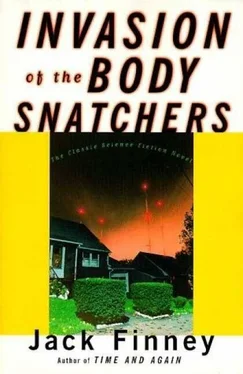For a long moment Mannie studied our faces, then he said, "The cases that night were the last that ever happened in Mattoon; the epidemic was over. There was no maniac; there never had been one." He shook his head in puzzlement. "Mass hysteria, auto-suggestion, whatever you want to call it – that's what happened to Mattoon. Why? How?" Mannie shrugged. "I don't know. We give it names, but we don't really understand it. All we know for sure is that these things actually happen."
I think Mannie saw, in my face and Jack's, a sort of stubborn unwillingness to accept the implications of what he was saying, because he turned to me and, voice patient, said, "Miles, you must have read, in med. school, about the Dancing Sickness that spread over Europe a couple hundred years ago." He looked at Jack. "An astounding thing," he said." Impossible to believe, except that it happened. Whole towns began to dance: first one person, then another, then every man, woman, and child in it, till they fell dead or exhausted. The thing swept all Europe; the Dancing Sickness; you can read about it in your encyclopedia. It lasted an entire summer, as I recall, and then – it stopped; died out. Leaving people, I suppose, wondering what in the world had happened to them." Mannie paused, watching us, then shrugged. "So there you are. These things are hard to believe till you see them, and even when you do see them.
"And that's what's happened in Santa Mira" – he nodded at the town at our feet. "The news spreads, semi-secretly at first. It's whispered around, as it was in Mattoon; someone believes her husband, sister, aunt, or uncle is actually an undetectable impostor, a strange and exciting bit of news to hear. And then – it keeps on happening. And it spreads, and there's a new case, or several, nearly every day. Hell, the Salem witch hunt, flying saucers – they're all part of this same amazing aspect of the human mind. People live lonely lives, a lot of them; these delusions bring attention and concern."
But Jack was slowly shaking his head no, and Mannie said quietly, "The body was real; that's what's bothering you, isn't it, Jack?" Jack nodded, and Mannie said, "Yes, it was; you all saw it. But that's all that's real. Jack, if you'd found that body a month ago, you'd have recognized it for what it was, a puzzling, possibly very strange mystery, but a perfectly natural one, too. And so would Theodora, Becky, and Miles. You can see what I mean." Leaning across me, he was staring at Jack intently. "Suppose that in August, 1944, in Mattoon, Illinois, a man had walked through the streets at night carrying a spray gun. Anyone seeing him would have supposed, and correctly, that the man was going to spray his rose bushes next day, or something of the sort. But one month later, in September, that man with the spray gun might have had his head blown off before he ever had a chance to explain."
Gently, Mannie said, "And you, Jack, you found a body, of approximately your height and build, which isn't too strange; you're an average-sized man. The face, in death, and this happens often, was smooth and unlined, bland in expression, and" – Mannie shrugged – "well, you're a writer, an imaginative man, and you're under the influence of the delusion that's loose in Santa Mira, and so are Miles, Theodora, and Becky. Me, too, undoubtedly, if I lived here. And your mind leaped for a connection, leaped to a conclusion explaining two mysteries in terms of each other. The human mind searches for cause and effect, always; and we all prefer the weird and thrilling to the dull and commonplace as an answer."
"Listen, Mannie, Theodora actually saw – "
"Exactly what she expected to see! What she was frightened to death of seeing! What she was absolutely certain to see, under the circumstances. I'd really be astonished if she hadn't! Why, you two had her, and she had herself, completely conditioned and ready for it."
I started to speak, and Mannie grinned at me mockingly. "You saw nothing, Miles." He shrugged. "Except a rolled-up rug, maybe, on a shelf in Becky's basement. Or a pile of sheets or laundry; almost anything at all, or nothing at all, would do. You had yourself so worked-up by then, Miles, so hyper-excited, running through the streets, that as you say yourself, you were certain you were going to find – what of course you did find. It was a lead-pipe cinch that you would." He held up a hand as I started to speak. "Oh, you saw it, all right. In every tiny detail. Exactly as you described it. You saw it as vividly and absolutely real as anyone has ever seen anything. But you saw it only in your mind." Mannie frowned at me. "Hell, you're a doctor, Miles; you know something about how this sort of thing works."
He was right; I did. In pre-med college, I once sat in a classroom listening to a psychology professor quietly lecturing, and now, sitting there on the edge of the road, the sun warming against my face, I was remembering how the door of that classroom had suddenly burst open, as two struggling men stumbled into the room. One man broke loose, yanked a banana from his pocket, pointed it at the other, and yelled, "Bang!" The other clutched his side, pulled a small American flag from his pocket, waved it violently in the other man's face, then they both rushed out of the room.
The professor said, "This is a controlled experiment. You will each take paper and pencil, write down a complete account of what you just saw, and place it on my desk as you leave the room."
Next day, in class, he read our papers aloud. There were some twenty-odd students, and no two accounts were alike, or even close. Some students saw three men, some four, and one girl saw five. Some saw white men, some Negroes, some Orientals, some saw women. One student saw a man stabbed, saw the blood spurt, saw him hold a handkerchief to his side which quickly became blood-soaked, and could hardly believe it when he found no bloodstains on the floor, as he left his paper at the professor's desk. And so on, and so on. Not a single paper mentioned the American flag or the banana; those objects didn't fit into the sudden violent little scene that had burst on our senses, so our minds excluded them, simply ruled them out and substituted other more appropriate things such as guns, knives, and bloodsoaked rags that we were each of us absolutely certain we'd seen. We had seen them, in fact; but only in our minds, hunting for some explanation.
So now I wondered if Mannie weren't right, and it was strange; I felt a sense of disappointment, a real let-down at the thought, and realized that I was trying to resist believing him. We do prefer the weird and thrilling, as Mannie had said, to the dull and commonplace. Even though I could still see in my mind, vivid and horribly real, what I'd thought I'd seen in Becky's basement, I felt, intellectually, that Mannie was probably right. But emotionally it was still very nearly impossible to accept, and I guess it showed in my face, and in Jack's.
Because Mannie got to his feet, and stood there for several seconds, looking down at us. Then he said, softly, "You want proof? I'll give it to you. Miles, go back to Becky's house and, in a calm state of mind, you'll see no body on that shelf in her basement; I guarantee that. There was only one body, in Jack's basement; the one that started all this. You want more proof? I'll give it to you. This delusion will die down in Santa Mira, just as it did in Mattoon, just as it did in Europe, just as all of them always do. And the people who came to you, Miles – Wilma Lentz and the others – will come back; some of them, anyway. Others will avoid you out of simple embarrassment. But if you hunt them up, they'll admit what the others tell you: that the delusion is gone, that they simply don't understand how or why it ever entered their heads. And that'll be the end of it; there'll be no more cases. I guarantee you that, too."
Читать дальше












